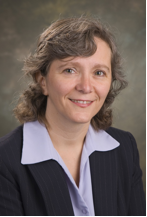Director, Biomolecular Core Laboratory
Co-Director of the INBRE
Central Research Instrumentation Core
Nemours Biomedical Research
Alfred I. duPont Hospital for Children
1600 Rockland Road
Wilmington, DE 19803
Email: ksolchur@nemours.org
Phone: (302) 651-6705
Fax: (302) 651-6767
Ph.D., Molecular Genetics, McGill University, Montreal, Canada, 1992
M.S., Molecular & Genetic Biology, Université Paul Sabatier, Toulouse, France, 1983

Dr. Sol-Church translational research aims at gaining a better understanding of pediatric disease pathology and providing Clinicians with tools that can help improve pediatric supportive care and/or therapeutic intervention. One of the projects, in collaboration with the Division of Clinical Genetics, is to understand the effect of gain of function mutations in children with Costello Syndrome (CS), a disorder that affects multiple organ systems of the body and is characterized by short stature; mental retardation; redundant loose skin, papillomata and predisposition for heart defect and cancer (rhabdomyosarcoma). CS children carry germline mutation in the HRAS gene, a key regulator of the MAPK signaling cascade controlling cell growth regulation, cell adhesion, motility, and apoptosis. Dr. Sol-Church’s goal is to identify genomic factors/modifiers, outside of the well-characterized mutation, that may influence expressivity of the disease. Costello syndrome shares many clinical findings with cardio-facio-cutaneous (CFC) syndrome, which is caused by mutation in other genes of the MAPK pathway, namely BRAF, MEK1 andMEK2 genes. Little is known about the contribution of each mutation to the function of the mutated proteins in CS and CFC patients. Thus, using cell lines derived from patients, we are studying how changes in gene expression impact the signaling cascade and correlate with the patient’s recorded clinical history. These genomics and functional studies may reveal other pathways downstream of RAS that may contribute to the varied phenotypes of these related syndromes and help develop a better understanding of the cellular mechanisms disrupted in these disorders.
Another project, with Dr. Kolb at the Nemours Childhood Cancer Center, focuses on the study of Osteosarcoma (OS), the most common primary malignant bone tumor in children and young adults. Despite the progress made in adjuvant chemotherapy, the overall survival rate remains around 60 percent. New promising therapeutics such as R1507, a fully humanized monoclonal anti-IGF1R antibody available in clinical trials, is effective in inhibiting the growth of a subset of human osteosarcoma tumors en-grafted into mice. However, while some of these xenograft tumors respond to therapy, others show little to no growth inhibition. The research team has characterized at the molecular level a panel of six osteosarcoma xenograft tumors that respond differently to R1507 therapy. Preliminary data suggests that inhibition of IGF signaling induces expression of EGFR in R1507 resistant tumors. Conversely, sensitive tumors show decreased EGFR expression which associates with a unique Sp1 binding site allele as well as a mutation in the EGFR ligand binding site. Using the hypothesis-free strategy afforded by the SOLiD™ Next Generation Sequencing, Dr. Sol-Church lab is looking at the miRNA complement in treated and control xenograft tumors.
The combined results from these molecular and functional studies will reveal important aspects of tumor biology and identify targets that may be exploited for the development of new therapeutics for OS.